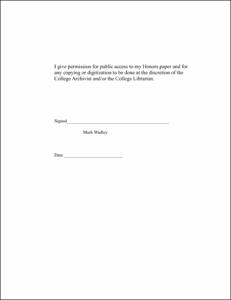Please use this identifier to cite or link to this item:
http://hdl.handle.net/10267/7410Full metadata record
| DC Field | Value | Language |
|---|---|---|
| dc.contributor.author | Wadley, Mark | - |
| dc.date.accessioned | 2010-06-02T18:56:01Z | - |
| dc.date.available | 2010-06-02T18:56:01Z | - |
| dc.date.issued | 2010-05 | - |
| dc.identifier.uri | http://hdl.handle.net/10267/7410 | - |
| dc.description | Mark Wadley granted permission for the digitization of his paper. It was submitted by CD. | en_US |
| dc.description.abstract | Within the contemporary philosophical community, written language serves as a primary means of conveying ideas, positions, and arguments; however, discussion of the content of these communicated ideas usually takes precedence over discussion about their modes of presentation—that is, the intentional arrangement of the words themselves. Taking into account a postmodern conception of language and its direct relation to meaning, it becomes important to examine the function of written discourse in the development of understanding, beginning with a recognition of the reader-writer relationship, in which the responsibility for meaning-making falls to both participants. This relationship, while indicative of the hermeneutic articulation of experience as contingent upon interpretation, also lends support to liberal ironist arguments for nonfoundationalist human solidarity. Though readers and writers interact within the context of any mode of writing, their relationship is particularly crucial to narrative fiction, presented here as a productive means of discussing philosophical ideas. Through examination of the philosophical works of Rorty, Sartre, Foucault, and Derrida and analysis of Jonathan Safran Foer’s novel Everything is Illuminated, we can come to a greater understanding of postmodern accounts of experience, the position of writing as a form of discourse, and the vital role narrative fiction plays in the liberal project of fostering solidarity. | en_US |
| dc.description.sponsorship | This honors paper was approved by Dr. Leigh Johnson, Dr. Kyle Grady, Professor C. Barrett Hathcock, and Dr. Patrick Shade. | en_US |
| dc.publisher | Memphis, Tenn. : Rhodes College | en_US |
| dc.rights | Rhodes College owns the rights to the archival digital images in this collection. Images are made available for educational use only and may not be used for any non-educational or commercial purpose. Approved educational uses include private research and scholarship, teaching, and student projects. Original copies of the programs are stored in the Rhodes College Archives. In all instances of use, acknowledgement must be given to Rhodes College Archives Digital Repository, Memphis, TN. For information regarding permission to use this image, please email the Archives at archives@rhodes.edu | - |
| dc.subject | Text | - |
| dc.subject | Student research | en_US |
| dc.subject | Honors papers | en_US |
| dc.subject | Philosophy, Department of | en_US |
| dc.title | This is a Work of Fiction: Rethinking the "Doing"� of Philosophy | en_US |
| dc.type | Thesis | en_US |
| Appears in Collections: | Honors Papers | |
Files in This Item:
| File | Description | Size | Format | |
|---|---|---|---|---|
| Wadley_Honors_2010.pdf | 311.88 kB | Adobe PDF |  View/Open |
Items in DSpace are protected by copyright, with all rights reserved, unless otherwise indicated.